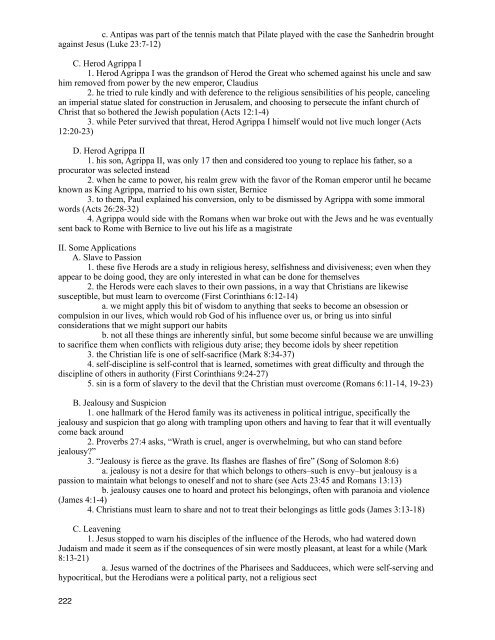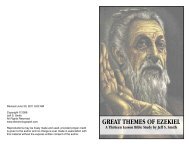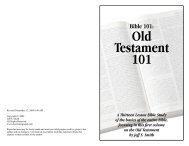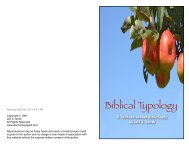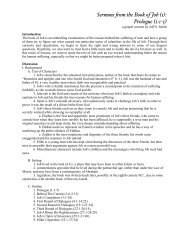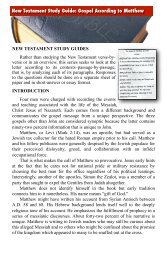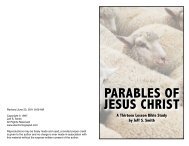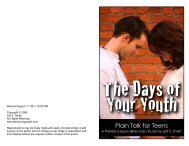Character Studies - ElectronicGospel
Character Studies - ElectronicGospel
Character Studies - ElectronicGospel
- No tags were found...
Create successful ePaper yourself
Turn your PDF publications into a flip-book with our unique Google optimized e-Paper software.
c. Antipas was part of the tennis match that Pilate played with the case the Sanhedrin broughtagainst Jesus (Luke 23:7-12)C. Herod Agrippa I1. Herod Agrippa I was the grandson of Herod the Great who schemed against his uncle and sawhim removed from power by the new emperor, Claudius2. he tried to rule kindly and with deference to the religious sensibilities of his people, cancelingan imperial statue slated for construction in Jerusalem, and choosing to persecute the infant church ofChrist that so bothered the Jewish population (Acts 12:1-4)3. while Peter survived that threat, Herod Agrippa I himself would not live much longer (Acts12:20-23)D. Herod Agrippa II1. his son, Agrippa II, was only 17 then and considered too young to replace his father, so aprocurator was selected instead2. when he came to power, his realm grew with the favor of the Roman emperor until he becameknown as King Agrippa, married to his own sister, Bernice3. to them, Paul explained his conversion, only to be dismissed by Agrippa with some immoralwords (Acts 26:28-32)4. Agrippa would side with the Romans when war broke out with the Jews and he was eventuallysent back to Rome with Bernice to live out his life as a magistrateII. Some ApplicationsA. Slave to Passion1. these five Herods are a study in religious heresy, selfishness and divisiveness; even when theyappear to be doing good, they are only interested in what can be done for themselves2. the Herods were each slaves to their own passions, in a way that Christians are likewisesusceptible, but must learn to overcome (First Corinthians 6:12-14)a. we might apply this bit of wisdom to anything that seeks to become an obsession orcompulsion in our lives, which would rob God of his influence over us, or bring us into sinfulconsiderations that we might support our habitsb. not all these things are inherently sinful, but some become sinful because we are unwillingto sacrifice them when conflicts with religious duty arise; they become idols by sheer repetition3. the Christian life is one of self-sacrifice (Mark 8:34-37)4. self-discipline is self-control that is learned, sometimes with great difficulty and through thediscipline of others in authority (First Corinthians 9:24-27)5. sin is a form of slavery to the devil that the Christian must overcome (Romans 6:11-14, 19-23)B. Jealousy and Suspicion1. one hallmark of the Herod family was its activeness in political intrigue, specifically thejealousy and suspicion that go along with trampling upon others and having to fear that it will eventuallycome back around2. Proverbs 27:4 asks, “Wrath is cruel, anger is overwhelming, but who can stand beforejealousy?”3. “Jealousy is fierce as the grave. Its flashes are flashes of fire” (Song of Solomon 8:6)a. jealousy is not a desire for that which belongs to others–such is envy–but jealousy is apassion to maintain what belongs to oneself and not to share (see Acts 23:45 and Romans 13:13)b. jealousy causes one to hoard and protect his belongings, often with paranoia and violence(James 4:1-4)4. Christians must learn to share and not to treat their belongings as little gods (James 3:13-18)C. Leavening1. Jesus stopped to warn his disciples of the influence of the Herods, who had watered downJudaism and made it seem as if the consequences of sin were mostly pleasant, at least for a while (Mark8:13-21)a. Jesus warned of the doctrines of the Pharisees and Sadducees, which were self-serving andhypocritical, but the Herodians were a political party, not a religious sect222


